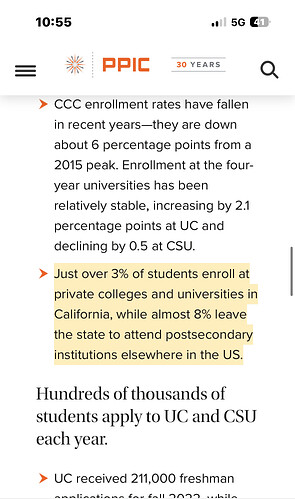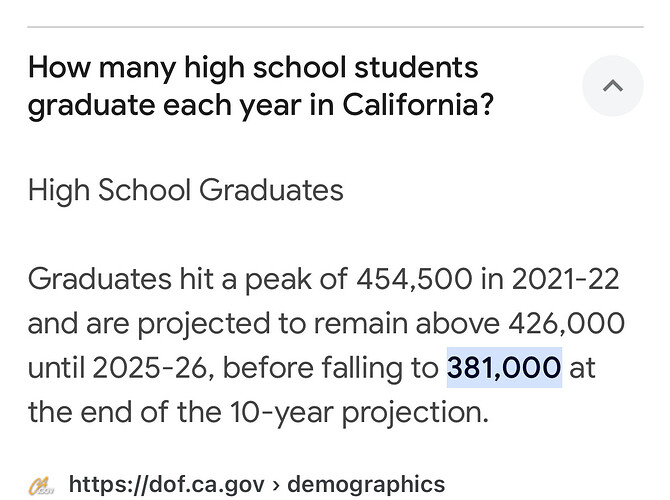And in case it hasn’t been posted (probably is upthread but worth repeating - and I now see ski posted it 12 days ago) here is the study:
SAT Undergrad Admissions (dartmouth.edu)
Sacerdote says Dartmouth is working on ways to better communicate to students what a helpful score might be so that students in the future aren’t scared off by the testing requirement.
It’s nice that a rep from Dartmouth says they are working on ways to better communicate to students in the future. Nevertheless, I wouldn’t assume that all the kids with relatively lower scores who didn’t feel their scores were high enough to submit under a test optional system will think their relatively lower scores are high enough to be worth the time/effort/cost to apply under a test required system.
I would hope that the word will trickle down to school counselors and hopefully some of these kids can attend local admission events. And hopefully some of these kids do their HW and find threads like this on line.
I don’t know how this is going to play out for D. What we know is that D has stated they wanted to increase diversity among their undergrad students for at least the last decade. With the exception of the last 3 cycles/covid years, they have always required tests…they weren’t diverse then, so what will change now?
I do hope they devise some better methods of outreach. But when relatively few URMs/FGLIs even take tests, I am a bit skeptical (and again, I don’t care what D does wrt its testing policy, and have no horse in the race). D standing alone (among its set of closest peers) by requiring tests is not going to incent more of the type of students they are looking for to take tests. IMO it will take many more schools going back to requiring tests to move that needle. And that’s not even addressing the fact that there is quite a bit of anti-testing mindset among many HS counselors who work with these types of students. Time will tell!
True, but maybe they can learn from schools like Vassar who have increased their diversity before being TO.
Reading the guide and taking the practice tests helped my son, not because of the material, but because he learned how the test was scored, got accustomed to taking it under time pressure, and knew what kind of problems to expect. He was also less stressed on the actual test day.
Your student’s mileage may vary.
Maybe Dartmouth wants to replace FGLI applicants from CA with FGLI applicants from FL.
The irony of going test optional is that the published range of scores has gone up since TO disincentivizes lower scoring students from submitting or even applying. It’s a bit of a vicious cycle. Dartmouth has apparently found evidence that there are desirable applicants with lower scores who mistakenly don’t submit scores when it would have helped them
It seems to me that Dartmouth is trying to break the vicious cycle by making tests mandatory and to communicate that a 1400 is good enough. Hope it works out
Interesting observation.
I realize that these posts were really early in this discussion, but our HS profile doesn’t include anything about standardized test results, GPA ranges, or college attendance rate. (Our school also doesn’t rank students.)
Our school profile has a very prominent pie chart showing demographics, then some general info about the school, % free lunch, % English learners, AP courses offered, sports teams, clubs, and a page full of colleges that students are attending.
Nothing that I can see would put an individual student’s GPA or test score in context. Actually, this was frustrating to us when trying to come up with a college list for S23, since we felt very much in the dark about how his stats compared to other kids at his school.
When I heard about the College Board’s Landscape product, I really wanted to see what it would look like for our school! Is there any way for an individual to see that?
Interesting. So the UC/CSU test blind policy might end up hurting some high potential URM/FGLI students who won’t be flagged (positively) by top private schools - either before or during application review - because they didn’t take the SAT.
The guidance counselor should be able to give you a sense of your students rank, even if it’s not reported, and the GC’s report to colleges has a box to check off to address rigor. Our schools counselors were transparent about which box they checked but I believe that can vary.
In terms of the college board’s landscape tool, I believe you need to be a registered college professional to access the site.
Not necessarily.
They still have the opportunity to test (for other schools).
Many schools have 70%+ test submission and if you take out athletes, anecdotally it’s higher.
Now folks with hooks have to make sure they communicate those hooks somehow (essay, activity, etc.) but if you see a common data set showing 78%, etc., I’d personally be submitting a test.
I wouldn’t hold UC/CSU/U Wash accountable per se. I see where you are going but just like a student is prepping for UC, they should also prep to the requirements of other schools on their list.
So unless a student is 100% hell bent on a California public, they need to look deeper.
But to your point- at 16/17 and counselors traditionally communicating to an in-state public option, the message could be lost.
In this case, it’s really adequate counseling that’s needed so avoid this situation.
I don’t disagree that a student has to look at testing policies for schools on their list, but relatively few California college going public HS grads consider/attend out of state schools. Around 50% of the college going grads go to CCCs. Around 30% go to UCs/CSUs. All those schools are test blind. About 8% go out of state, most on the west coast, where all schools (AFAIK) are test blind/test optional.
Headwinds to testing in California:
- Schools that most college going students attend are test blind
- High student:counselor ratios. Counselors focused on social emotional responsibilities and making sure all students graduate from high school.
- About 60% of CA public school students qualify for free/reduced lunch. A relatively small proportion of those who are high stats may have a chance to be accepted to meet full need schools…the majority of which are test optional/test blind. None of those that are TO would prefer a score from these students. Many of these students don’t go to any college after HS.
- Anti-testing sentiment among some counselors, especially those who work with disadvantaged students, which leads to…
- Fewer seats to take tests. In some areas, HSs don’t offer many, if any, test dates, making it difficult for a disadvantaged student to find a seat even if they want to test.
It’s difficult to move the needle on any of these factors. It’s much easier for a high stats disadvantaged student to just not consider Dartmouth because they are test required and apply to D’s competitors who don’t require tests.
Good luck to California’s Dartmouth AO…they need to find the type of disadvantaged students they are targeting, make sure they take an SAT/ACT, and get them to apply w/ the SAT/ACT they have (but only if it’s a certain minimum…which D hasn’t said what that is).
And agree knowledge of the school or test is likely light but I assume testing robust.
My son actually took his final ACT test in CA - we were on vacation.
You are right - Dartmouth is making their lives harder but in many ways it’s why I don’t believe their reasoning.
And anyone who posts a chance me with a 1400 will be told - don’t submit. And while we are a snippet, others in society likely will advise similarly. Yet that 1400 is what Dartmouth seeks.
I just don’t see how they achieve a goal by narrowing their potential consumer base which to your point is being done. Hence I don’t believe their stated goal is true.
? What doesn’t make sense?
THEIR stated goal doesn’t align with the “worldview” or educational philosophy of many people on this thread. But since it doesn’t seem that anyone posting is an actual Dartmouth stakeholder (professor, current student, alum, trustee) does it matter that you don’t agree with their decision, or think that it imposes a significant burden on kids?
Makes perfect sense. They are going to admit who they want, based on the data they want to see, using their own professional judgement as to how that data, AND the essays, recommendations, EC’s, etc. reflect on the applicant’s ability, potential, etc.
I love the argument that it’s making ANYONE’s life harder. You don’t want to test? Don’t apply to Dartmouth. See? It’s so easy to simplify your life.
100% my thought actually.
And I suspect, this and the Supreme Court will hurt their #s. Others, including Dartmouth from what others are saying is their goal, argue it will help.
Guess we’ll find out but I totally agree with what you just wrote and I believe Dartmouth wants to stop admitting (and likely passing through) those that don’t belong.
I hope more and more schools continue to add the test.
I’m
About 70% of the approximate 425,000+ CA HS graduates go to college within 12 mos of graduation, and 8% go out of state. Given these numbers, that could represent approximately 24,000 students who attend college out of state each year. That is no small number.
That is not true.
I, and several experienced posters, have always paid attention to context and said so explicitely.
If you’re from an upper middle class area where the average HS score is 1200 and double digit nulbers scored 1500? Sure, don’t bother with a 1400 for ivy+.
But Dartmouth wants to reach middle class, titleI, rural, and urban HS.
It can easily communicate “we’re seeking kids who score +300pts or more compared to your school’s average, whatever that is”. Aptitude and the ability to beat the odds can be revealed with a 1260 score when your school’s average is 810. They can make it clear the GC can just list the school’s average (not long nor difficult for overworked counselors).
D. may also have written off CA’s FGLI students entirely - very very few FGLI students there have any reason to be taking the test.


